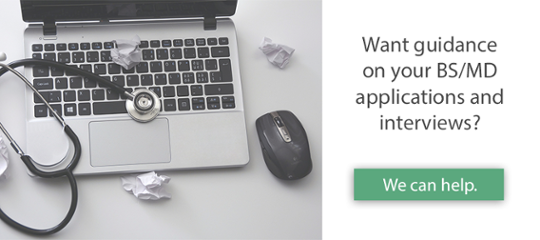Summer Activities for the Future BS/MD Applicant

If you’re a high school student considering a BS/MD combined program, you’ve already recognized your goal of becoming a doctor and have probably already found the drive necessary to push you towards your goal. You are most likely a high-achieving student with a list of impressive extracurriculars to match. You’re one of the few who has found their path in life early, and you’re ready to work for it.
Usually, this path is pretty clear during the school year. You have a course load that fills your school’s graduation requirements with challenging STEM-heavy selections. You might participate in Science Olympiad or the science fair. Maybe you have joined or even formed your own study groups for AP Biology or AP Chem.
When summer rolls around, you’re ready for a break, right?
Unfortunately, your hard work doesn’t stop once the school year lets out. BS/MD programs are among the most competitive programs in the country. Acceptance rates to Harvard sit right around 5%, but acceptance rates to BS/MD programs are even tougher, at around 4%. This means, you have no time to rest on your laurels.
In order to get accepted, not only will you need to be among the top students in your class academically, but also you’ll need to be the pinnacle of extracurricular success, not just during the school year, but year round.
Consider it this way—the pool of candidates applying for BS/MD programs will already be the best of the best. Most will already have good grades and strong test scores, so those alone won’t be enough to set you apart in the crowd. Most will pursue similar extracurriculars during the school year, too. But summer activities are one of just a few remaining factors that can set you apart from the rest of the applicant pool.
So how exactly should you spend the summer if you’re hoping to put yourself one step ahead in the BS/MD program applicant pool? And how can you land one of these positions?
To learn about effective summer activities for the BS/MD hopeful, and what to do if you can’t participate in one, read on.

What Is the Goal of Summer Activities For Prospective BS/MD Students?
Because the pool of candidates is already so competitive, you’ll need to choose summer activities that bolster your overall application. Summer activities will need to accomplish two goals.
First, they need to support and build upon the strong profile you’ve already established. They should reinforce academic strengths or interests that you’ve pursued over time and highlight unique leadership experiences in areas in which you’ve already shown a commitment.
Second, they should exemplify your commitment to service. While many students get wrapped up in the science aspect of the medical field, it can be easy to forget that ultimately a career in medicine is about helping other people. To drive home your dedication to helping others, you should strive to show a dedication to service too.
What Summer Activities Should BS/MD Hopefuls Pursue?
With the goal in mind of building on your current profile and showing commitment to service, here are a few strong choices for summer activities:
Research Assistant Position
Securing a research assistant position should be one of your top choices in terms of summer activities if you are planning to apply to BS/MD programs. Not only are these positions competitive to secure in the first place, but also most are directly relevant to the field since all doctors are scientists, and many participate in research during the course of their career.
As a research assistant your role may vary greatly depending on where you’re working and with whom, so be sure to clarify exactly what your position will entail well ahead of time. In some labs, you will be involved in actual experimentation and gathering data, while in others you could literally be sweeping floors and entering long data lists into computer spreadsheets. While obviously the former is a more exciting option, the latter still provides you with hands-on, behind-the-scenes knowledge of the daily work that goes on in a research lab.
There are two primary types of research assistant positions commonly available to high school students.
Some colleges or laboratories have official research assistant programs or mentorships to which you apply formally and for which you are accepted based on academic and extracurricular success. For example, both Princeton and Stanford host high school research assistants during the summer, though Princeton does not provide housing for the program.
You may also be able to arrange an informal research assistant role through a local college or lab. To do this, you’ll need to network extensively and send emails of interest to possible mentors. It’s important to note, though, that if a college or lab offers a formal program, you should not try to contact professors or researchers directly. Instead, respect the application process for the program and go through that.
For information about securing a research assistant role, check out our article How to Get a Research Assistant Position in High School.
Volunteer/Service Work
As a BS/MD program applicant, it will be imperative for you to show your commitment to serving others. The field of medicine is equal parts science and service, so be certain that you don’t sacrifice one for the other. Often the science part of the equation can be taken care of through your courses and school-year extracurriculars. If this is the case, the summer is the perfect time to pursue the service side of the equation.
It may be hard to find a service program that allows you to volunteer directly in a medical or clinical environment, but that’s alright. There are many opportunities indirectly connected to medicine such as public health or public safety initiatives. Reach out to local offices to see if there are any opportunities available. You might help to publicize flu immunization clinics or blood drives, create flyers about seatbelt safety, or speak with elementary students about healthy eating.
If you can’t find an opportunity that seems like a good fit, creating your own is another strong option. Choose a local cause that’s important to you on a personal level. What public health issues are facing your community? What issues affect your family or friends?
Think about the issues that are important to you personally and make a plan to get involved. You might even recruit some friends to help alongside you. Soon, you could have a whole team of high school students meeting weekly to practice computer skills with nursing home residents or volunteering to read stories to kids in an underfunded after school program.
Whatever you do, try to make sure it is relevant and important to you on a personal level. We know from Harvard’s recent Making Caring Common campaign that it can be difficult to have a meaningful experience when you don’t form relationships with the people and community around you while serving them. Selecting a local cause that’s already important to you makes this a non-issue.
Sometimes, students interested in medicine or BS/MD programs will pursue service options abroad that include actual experience in a medical or clinical setting. Because these trips are generally short in duration and exotic in locale, it can be difficult to form the meaningful connections that the MCC campaign emphasizes. Further, these types of experiences can be emotionally draining. You are working with real people experiencing real trauma, and your resources to truly help them are extremely limited. It’s often a more meaningful and deeper experience to serve in your local community, even if you feel that you are not effecting change on a large scale.
Summer Programs
Many medical schools host summer programs for high school students exploring a career in medicine. This can be a good choice for future BS/MD program applicants, but be sure that you pursue a competitive or in-depth program. Enrolling in a program designed to introduce students to the premed experience might indicate that you are only just now starting to consider this path and have not fully committed yourself to it yet.
Instead, find programs that expose you to the rigorous coursework required of premed students, give you practical experiences in medicine, and even provide hands-on lab training. Options exist at many top schools like Stanford, Duke, UPenn, USC, Tufts, and Georgetown. Even some hospitals like Dana Farber Cancer Institute in Boston offer summer programs for motivated high school students.
Summer programs also provide the opportunity to form lasting connections with the academic faculty at top colleges and universities. Consider which BS/MD programs you might like to attend and then explore what programs those schools have to offer. If you can create a lasting relationship with the science faculty and staff at a school you’re interested in attending, make sure to keep in touch with these mentors after the program and use them as resources during the admissions process.
Medical/Clinical Work
Due to your age, it’s unlikely that you’ll be able to find a position working hands-on with patients, but that doesn’t mean that you won’t be able to find a job in a clinical setting. Many hospitals or healthcare facilities employ young people for anything from collecting laundry to delivering meals.
While it’s not the most exciting job, you will undoubtedly gain more insight into and appreciation for all the menial tasks that need to be done in order for doctors to do their jobs well.
Alternatively, shadowing a healthcare practitioner is another great option. There may be some restrictions about what patient information you can access or certain restricted areas of the hospital, but in general many enterprising high school students are able to find their way into a hospital or other medical setting in the shadowing capacity.
Start by networking with friends, family, or your own doctor. Once you find a practitioner willing to have you along for a few weeks, be sure to take advantage of the opportunity. Ask lots of questions about why he or she went into medicine, what the early years in practice were like, and how to choose a specialty. Before you are done shadowing, ask if the doctor can put in touch with a colleague in another specialty who also might allow you to shadow.
While none of these opportunities actually put you in charge of administering any type of care, they do provide invaluable insight. Most BS/MD candidates will be able to write and talk about why they are interested in medicine in hypothetical terms, but fewer will have firsthand experience and examples to draw on when writing essays or answering interview questions. The ability to base your vision on real-life experiences will set you apart from many applicants.
Start your own branch of HOSA-Future Health Professionals
HOSA-Future Health Professionals, formerly known as Health Occupations Students of America, is a “national career and technical student organization endorsed by the U.S. Department of Education and the Health Science Technology Education Division.” Its aim is to promote career opportunities in the health care industry and enhance the quality of healthcare in the United States. The organization is composed of students who wish to pursue a career in healthcare and who are joined and supported by professional, alumni, and honorary members.
HOSA provides a broad variety of opportunities, including leadership development, competitive events, national leadership conferences, and state conferences. It also provides a list of internships available in the industry.
If your school does not yet have a branch of HOSA-Future Health Professionals, you can read about creating your own affiliation here. You will need the support of your teachers to get the process underway, but summer is the perfect time to research exactly what you will need to do to plan a course of attack. For example, you can begin by brainstorming a list of faculty members who might be interested in sponsoring the chapter. Starting a new branch of HOSA not only showcases your own commitment to a career in the medical field, but also paves the way for future medical professionals at your school.
What if I can’t do any of these things?
Of course, these summer activities all assume that you have the choice to do something different over the summer. For many students, this isn’t the case. Maybe you need to work full-time to save for college or to contribute to your family’s finances. Maybe you need to provide childcare for younger siblings so that your parents may continue to work. If this is the case for you, there’s no need to stress.
Rather than trying to hide your obligations or choices, use them as talking points or inspiration for your essays. Put yourself in the shoes of the admissions committee and imagine what questions they might have after skimming through your academic and extracurricular activities. Never let an obvious question go unanswered.
Allow these obligations or choices to speak to who you are as a person. Elaborate about how these experiences have shaped you and inspired you, and connect them to your motivation for becoming a doctor. Never be ashamed of who you are, and never, ever try to be someone you’re not. Instead, embrace the circumstances that have shaped you, and put them in context so admissions officers can understand you better as a person and an applicant.
For the academically-motivated BS/MD hopeful who thrives in the structure of a school environment, an unplanned summer can seem daunting. In reality, though, the summer can be an opportunity to refine your profile as an applicant, build upon your strengths, and fill in any gaps that exist. Focus on pursuing relevant academic activities or showcasing your commitment to serving others.
Want access to expert college guidance — for free? When you create your free CollegeVine account, you will find out your real admissions chances, build a best-fit school list, learn how to improve your profile, and get your questions answered by experts and peers—all for free. Sign up for your CollegeVine account today to get a boost on your college journey.
To learn more about combined BS/MD programs, read these CollegeVine posts:
Timeline: Applying to BS/MD Programs
BS/MD Programs vs PreMed: Which is Right For You?
CollegeVine’s Top 25 Combined BS/MD Programs
A Beginner’s Guide to 7-Year Med Programs
How to Write 7-Year Med Program Essays
How to Survive Your 7-Year Med Program Interview


